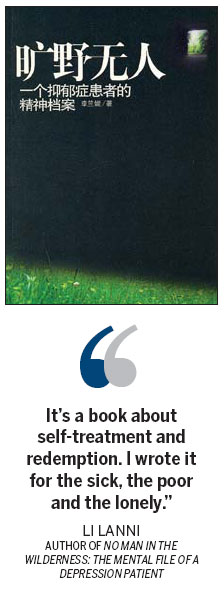Beating the blues
Updated: 2011-12-02 07:39
By Yang Guang (China Daily)
|
|||||||||
|
Writer Li Lanni says she's learning to face love in her next book, after struggling with illness for years. Zhang Wei / China Daily |
An author's work helps her conquer the depression that debilitated her life but inspired her writing. Yang Guang reports.
Fear chases Li Lanni into her closet. She curls up in the darkness and searches for a tiny thread of light through a chink in the door.
The 55-year-old Shenzhen-based writer has been tenaciously fighting intermittent depression since 2003. But her mental illness is not her only serious ailment - she has had three operations and five chemotherapy sessions since she was diagnosed with thyroid cancer in 1988.
But that hasn't stopped the recently elected Shenzhen Writers' Association chairperson from being exceptionally active during this year's Eighth National Congress of the Chinese Writers' Association, from Nov 22 to Nov 25.
The author, who started her career in the 1980s, is best known for her 2008 nonfiction book No Man in the Wilderness: The Mental File of a Depression Patient. The book is an honest examination of depression and its causes.
"It's a book about self-treatment and redemption," she says.
"I wrote it for the sick, the poor and the lonely."

People's Literature Publishing House publisher Pan Kaixiong says reading No Man in the Wilderness reminds the public of how ignorant we are about mental illness.
"The point of the book is to question whether we can open up in the face of it," he says.
"The sun rises every day. It will finally break into the small dark corners we occupy, just as Li tells us in her book."
Li was born into a military family, and spent a lonely and isolated childhood, moving often.
Her familiarity with disease began early in life.
As a child, she recalls being hospitalized for a vascular tumor in a ward, where she watched the dead being wheeled into the mortuary. She regularly contemplated life and death in adolescence.
"Diseases are instrumental to writing," she says.
"They prompt introspection."
A local official in Maoming, Guangdong province, asked Li - who was then working as a radio announcer - to join a young writers' course the government had established after he noticed she read often. The class' capstone project was a short story.
"I knew little about how to write back then," she recalls.
"So I wrote a piece in the form of a diary."
Her story sparked debate among the teachers as to whether or not it could be considered literature. They sent it to the provincial newspaper's editors for their opinion. The instructors and Li were astonished when the story was published and won a debut story award.
Li went to Guangdong province's Shenzhen in 1983 to work as a Shenzhen Youth Weekly reporter. She was transferred to the Shenzhen Literature and Arts Federation as a professional writer a year later.
She began to dream of macabre deaths in endless nightmares. Mutilated limbs and grisly corpses filled her sleep.
By the end of 2002, her insomnia had become insufferable.
She went to the doctor to get sleeping pills but was told she suffered from serious depression.
That's when she learned about depression's three indicative symptoms: more than 15 days of sleep problems, loss of interest in previously pleasurable activities, and suicidal thoughts.
Li couldn't believe she was depressed.
"I have nothing to be depressed about," she says.
"My friends say I'm extroverted and optimistic."
She tried to read all she could about depression and realized she was only pretending to be happy.
Li says the most fearsome characteristic of depression is that it shows no external signs, such as cuts, scars or tumors, while the patient is bleeding and even dying inside.
"Living is harder than dying" is a thought she often entertained.
But she forced herself to find her will to live, she says.
She pushed herself to take walks with her dog Le Le and to record every iota of happiness she experienced. This was how the idea for No Man in the Wilderness occurred to her.
The writing process, however, has been more than painstaking, Li says. She could hardly read, let alone write, when she was half done. That got worse when there was a third left.
"I was near collapse and couldn't help but hurt myself," she recalls.
"It was only then that I understood why people with depression can't express their voices."
Now that Li's depression and cancer are under control, she has started working on her new book - an exploration of love through her interactions with Le Le.
"I adopted Le Le to help me deal with my sadness," she says.
"But now that I've reclaimed life, I love watching the dog grow day by day. I learned to face death in No Man in the Wilderness,and I am learning to face love in my new book."












